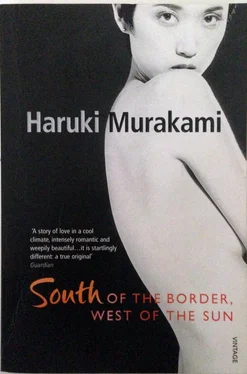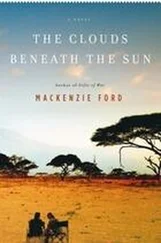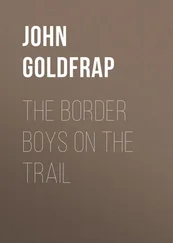The light finally changed to green, and the taxi took off. Izumi’s face was unchanged to the end. I stood rooted to the spot, watching until the taxi was swallowed up in the surge of cars.
I walked back to my car and slumped into the seat I had to get out of there. As I was about to turn on the engine I was hit by a sudden wave of nausea. Like I was going to spew my guts out But I didn’t vomit Resting both hands on the steering wheel, I sat there for a good fifteen minutes. My underarms were drenched in sweat, and an awful smell rose from my body. This wasn’t the body that Shimamoto had so gently loved. It was the body of a middle-aged man, giving off an awful acrid stink.
A few minutes later, a patrolman came up to my car and knocked on the window. I rolled it down. “You can’t park here, pal,” he said, looking around inside. “Get your car out of here.” I nodded and started the motor.
“You look terrible. Do you feel sick?” the policeman asked me.
Wordlessly, I shook my head. And started driving.
It took me several hours to recover. I was drained, completely, leaving an empty shell behind. A hollow sound reverberated through my body. I parked my car inside Aoyama Cemetery and stared listlessly through the windshield at the sky beyond. Izumi was waiting for me there. She was always somewhere, waiting for me. On some street corner, beyond some pane of glass, waiting for me to appear. Watching me. I just hadn’t noticed.
For several days afterward, I couldn’t speak. I’d open my mouth to talk, but the words would disappear, as if the utter nothingness that was Izumi had taken over.
After that strange encounter, though, the afterimages of Shimamoto began, gradually, to fade. Color returned to the world, and I no longer had the helpless feeling that I was walking on the surface of the moon. Vaguely, as if looking through a glass window at changes happening to someone else, I could detect a minute shift in gravity and a gradual sloughing off of something that had clung to me.
Something inside me was severed, and disappeared. Silently. Forever.
While the trio was on break, I went up to the pianist and told him he no longer needed to play “Star-Crossed Lovers.” I mustered up the friendliest smile I could. “You’ve played it for me enough. It’s about time to stop.”
He looked at me as if weighing something in his mind. The two of us were friends, had shared a few drinks and gone beyond your usual polite conversation.
“I don’t quite understand,” he said. “You don’t want me to go out of my way to play that song? Or you don’t want me to ever play that song again? There’s a big difference, and I’d like to be clear about this.”
“I don’t want you to play it,” I said.
“You don’t like the way I play it?”
“I have no problems with your playing. It’s great. There aren’t many people who can handle that tune the way you do.”
“So it’s the tune itself you don’t want to hear anymore?”
“You could say that,” I replied.
“Sounds a little like Casablanca to me!” he said.
“Guess so,” I said.
After that, sometimes when he catches sight of me, the pianist breaks into a few bars of “As Time Goes By.”
The reason I didn’t want to hear that tune again had nothing to do with memories of Shimamoto. The song just didn’t do to me what it used to . Why, I can’t say. The special something I’d found ages ago in that melody was no longer there. It was still a beautiful tune, but nothing more. And I had no intention of lingering over the corpse of a beautiful song.
“What are you thinking about?” Yukiko asked me as she came into the room.
It was two-thirty in the morning. I was lying on the sofa, staring at the ceiling.
“I was thinking about a desert,” I said.
“A desert?” she asked. She’d sat down next to my feet and was looking at me. “What kind of desert?”
“Just a regular desert. With sand dunes and a few cactuses. Lots of things are there, living there.”
“Am I included in this desert too?” she asked.
“Of course you are,” I said. “All of us are living there. But actually what’s really living is the desert itself. Like in the movie.”
“What movie?”
“The Disney film The Living Desert . A documentary about the desert. Didn’t you see it when you were little?”
“No,” she said. I thought that was a bit strange. Everybody in my elementary school had been herded off to the movie theater to watch it. But Yukiko was five years younger than me. She might have been too young to see it when it came out
“Why don’t we rent it next Sunday and watch it together? It’s a good movie. The scenery’s beautiful, and there’re all sorts of animals and flowers. The kids will like it.”
Yukiko smiled at me. It had been such a long time since I’d seen her smile.
“Do you want to leave me?” she asked.
“Yukiko, I love you,” I said.
“Maybe you do, but I’m asking you whether you want to leave me. The answer is either yes or no. I won’t accept any other.”
“I don’t want to leave you,” I said. I shook my head. “I probably don’t have the right to say this, but I don’t want to leave you. If I left you now, I don’t know what would happen to me. I don’t want to be lonely ever again. I’d rather die.”
She stretched out a hand and placed it on my chest. And looked deep into my eyes. “Forget about rights. I don’t think anyone has those kinds of rights,” she said.
Feeling the warmth of her hand on my chest, I thought of death. I might very well have died on that day on the highway with Shimamoto. If I had, my body would not exist I would be gone, lost forever. Like so many other things. But here I am. And here is Yukiko’s warm hand on my chest
“Yukiko,” I said, “I love you very much. I loved you from the first day I met you, and I still feel the same. If I hadn’t met you, my life would have been unbearable. For that I am grateful beyond words. Yet here I am, hurting you. Because I’m a selfish, hopeless, worthless human being. For no apparent reason, I hurt the people around me and end up hurting myself. Ruining someone else’s life and my own. Not because I like to. But that’s how it ends up.”
“No argument there,” Yukiko said quietly. Traces of her smile remained at the corners of her mouth. “You are definitely a selfish, hopeless person, and yes, you have hurt me.”
I looked at her for a while. Nothing in her words seemed to blame me. She was neither angry nor sad. She was merely explaining the obvious.
I took my time, trying to find the right words. “I always feel like I’m struggling to become someone else. Like I’m trying to find a new place, grab hold of a new life, a new personality. I guess it’s part of growing up, yet it’s also an attempt to reinvent myself. By becoming a different me, I could free myself of everything. I seriously believed I could escape myself–as long as I made the effort. But I always hit a dead end. No matter where I go, I still end up me. What’s missing never changes. The scenery may change, but I’m still the same old incomplete person. The same missing elements torture me with a hunger that I can never satisfy. I guess that lack itself is as close as I’ll come to defining myself. For your sake, I’d like to become a new person. It may not be easy, but if I give it my best shot, perhaps I can manage to change. The truth is, though, if put in the same situation again, I might very well do the same thing all over. I might very well hurt you all over again. I can’t promise anything. That’s what I meant when I said I had no right I just don’t have the confidence to win over that force in me.”
Читать дальше












